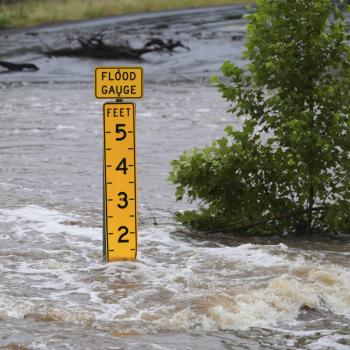
Reflection Two
Friends, today I continue our Advent series at Good Shepherd, Brentwood, TN, entitled “Normal isn’t coming back. Jesus is.” Today’s focus is entitled, “Leaving behind ‘Left Behind’.”
+++++
There is probably no language in the whole of Scripture that is more often misunderstood than apocalyptic – which is the technical term that applies to this reading from .
It is language scattered across the prophetic literature of the Old Testament. It appears in the Book of Daniel. It can be found in the Gospels and in the Book of Revelation. And with regularity, there have always been people who have wanted to read it literally, lining up the images, and using it as a roadmap to the future.
In our own country, there are those who will remember Hal Lindsey, who wrote a book entitled, The Late Great Planet Earth, first published in 1970. Lindsey stitched together the nuclear arms race, the rise of the Soviet Union, the assassination of President John Kennedy, and tensions in the Middle East, concluding that the end was near. The book sold millions of copies and despite the fact that absolutely nothing Lindsey predicted came true, it is still in print.
More recently, Tim LaHaye wrote a long series of (truly terrible) Left Behind novels, describing the end itself, replete with crashing airplanes and other kinds of mayhem. Cleverly, if not eloquently, LaHaye cleverly argued that while his stories were fictional they might actually describe how the world could end. As bad as the books were, LaHaye sold millions as well and they were used as the basis for a movie that was every bit as bad as the books.
Books of this kind have had a terrible impact on the life of the church. I have lost track of the number of Christians who have never read the Bible’s apocalyptic language and the ones who have are often frightened by it. But they are convinced that whatever it all means, it is probably more or less what Lindsey, LaHaye, and others have in mind.
But there are a number of problems with Lindsay-LaHaye approach to interpreting the apocalyptic language of Scripture.
One is that the language is plainly figurative and visionary in nature. If you read enough of this literature – and I have – you discover that the people who use it, including Jesus, are not trying to construct a roadmap to the end of the world. Instead, the images are more like a series of paintings in an art gallery. The writer takes you to one painting and says, “You might think of the end the way I’ve portrayed it here.” But before you have completely absorbed that image, he turns to another painting and says, “ But you might think of it this way.” There is no single, discernible chronology. The images aren’t meant to be taken literally.
Another problem with reading apocalyptic language as a roadmap to our future is what it says about the original use of the language. If we argue that the words of Jesus and other parts of the Bible are a roadmap to our time and our place, then that means that the original words meant nothing to the people who first heard them. So, we are forced to imagine the people around Jesus saying, “I don’t know what he means — but people who don’t yet exist, speaking a language that hasn’t been created, on a continent that hasn’t been discovered by people who don’t yet exist, living under circumstances we can’t imagine — will.” If the content of the Bible is God’s word to everyone who has heard it, then it has to have meant something to the people who heard it first; and reading the Bible as if it were a time capsule or a crystal ball is foreign to the way that people imagined God speaking to them.
The third problem with the Lindsey-LaHaye approach is the literalism of it all. If I told you that the Industrial Revolution hit the economy of the world with the force of an earthquake, you would instantly know that I didn’t mean an earthquake actually happened and you wouldn’t be asking me what number it was on the Richter Scale. Similarly, when Jesus talks about “signs in the sun, the moon, and the stars” and “nations confused by the roaring of the sea and the waves”, we shouldn’t be asking about tsunamis. Jesus is talking about his own return and the impending judgment that accompanies it as having earth-shattering implications.
But the biggest problem of all is the way in which the Lindsay-LaHaye line of reasoning has robbed the church the important insights that come from this kind of language. It has made Christians afraid of being “left behind”. They have wasted time monitoring the behavior of their neighbors. And it has created a generation of believers who read Scripture the way you would a ouija board, when – in fact – its message is very different.
One, the language Jesus uses in today’s Gospel is not meant to induce fear. It is meant to inculcate courage. People who spend their time fearfully reading the news, wondering if it is the key to some larger catastrophe, are immobilized spiritually.
They lack the grounding to face each day with confidence. They are surrounded by people scanning for tragedy. They are dominated by a spirituality of scarcity.
And you find this kind of fearful living in the secular realm as often as you do in the church. You hear it in the logic that the world is too broken to bring children into it. You see it in movies that trade in disasters. You see it in the new trend that offers trauma-based education. Life-logic of that kind is a self-fulfilling failure, creating a world filled with peril and people who lack the confidence to navigate it.
By contrast, Jesus observes, “Be on guard so that your hearts are not weighed down with dissipation and drunkenness and the worries of this life, and that day catch you unexpectedly, like a trap.” (Luke 21:34-35a) Jesus was – by any measure – exceedingly compassionate. But he was the Good Shepherd, not the Good Co-dependent and he called his disciples to serve as his companions, not his cowering dependents.
That said, the second thing to note is that the words of Jesus aren’t about the power of positive thinking. The confidence that he offers is not grounded in the hope that circumstances will improve or in the notion that we can power-through the challenges that we face.
Jesus’ original words on this subject probably reflected his sense that Israel was on a collision-course with its Roman overlords and that Jerusalem would inevitably be destroyed. (And it was.) So, confidence in changing circumstances wasn’t even in the offing.
Instead, the confidence or hope that he commends is grounded in the goodness of God. And Jesus was telling his disciples to embrace that hope, rather than trusting in happenstance or their own strength.
As Corrie ten Boom put it centuries later, “Never be afraid to trust an unknown future to a known God.” Ten Boom knew that reality well. Living in Holland during World War II, her family offered refuge to Jews seeking to escape the Holocaust and together, her family rescued 800 refugees. When a neighbor betrayed them, Ten Boom and her family were sent to the concentration camps for almost a year and in the course of the year her sister , Elizabeth died. But Elizabeth’s life-logic was the same one that Corrie embraced. Twelve days before she die, Elizabeth told Corrie, “There is no pit so deep that He [God] is not deeper still.”
Embrace that hope. Let it fill your lives. Share it with your children.
The third truth embedded in biblical apocalyptic language is that God is in charge of history. You see, when we hear the word apocalyptic, we hear revelations of tragedy. Secrets revealed. Thanks, but no thanks, to Lindsey and LaHaye.
But the biblical use of apocalyptic language is about “unveiling the truth” – unveiling truth that God is present everywhere – unveiling the truth that God is the master of history — that he brought it into being and he will bring it to the conclusion that he desire – and the unveiling of the truth that — if that is true — then all the choices we make are made in his presence.
This should be reassuring to Christians, of course. To insist that Christians should live with courage and that courage is justified by the goodness of God is a powerful way to center our lives. But it would remain fairly abstract if God were not at work in history. That is why, for example, that the Resurrection — as an event in history — is so important to the Christian faith.
But this same truth should also alert us to our moral obligation before God. If our lives are lived out in God’s presence, then the will of God should be our overriding concern. That way of life cannot be captured in legislation, it cannot be reduced to a list of rules, it is far more subtle and demanding than the notion that “Christians should be nice”.
The Christian life is, instead, about the transformation of our hearts. An openness to anything and everything that God might do through us. And the kind of inner conversation with Christ that draws us closer to him, even as he draws closer to him.
This is why Jesus tells his disciples, “Be alert at all times, praying that you may have the strength to escape all these things that will take place, and to stand before the Son of Man.” (Luke 21:36) That reassurance should sound familiar. We assert it every Sunday in the words of the Nicene Creed, when we declare that Christ will come again, to judge the living and the dead. We affirm it every Sunday in the Eucharist when we declare in the Eucharist, “Christ has died, Christ is risen, Christ will come again.”
The contemporary challenge, then, is to “leave behind ‘Left Behind'” in all its forms — both spiritual and secular; and let the truth of Jesus’ words seep into your hearts. Because normal isn’t coming back but Jesus is.













